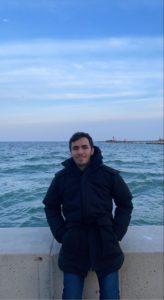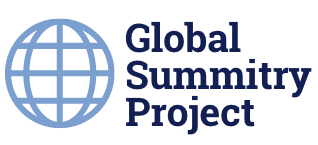
Henrique Fernandes Faustino
Henrique Fernandes Faustino is a journalist and student at the University of Toronto, currently completing a joint degree program at Centennial College. He has previously worked as a journalist for the Joca news outlet in Brazil and contributed to a joint humanitarian mission with them and the UNHCR in 2021. Henrique is fluent in Portuguese, Spanish, English and French, and is looking to learn at least one more language. His works have been published in three languages and Henrique is eager to establish himself in Canada professionally.
One particular night in 2016 stands out in her memory.
Turkish journalist Arzu Yildiz recalls holding her seven-month-old daughter and cautiously stepping out onto her apartment balcony at the only time it was safe, 3 am.
Below, she saw a group of boys and her daughter “was shocked, sick, she was scared,” Yildiz recalls.
“She hugged me very hard, and I realized she didn’t know life. She’d only seen me and her (seven-year-old) sister.”
It was in the quiet and the dark that Yildiz made the decision that would forever change her life.
“I told (my kids) that night, I had no right to do this to them. I decided to escape first.”
Bullied, threatened, persecuted – and fearing for her children’s safety. These are just some of the tensions 42-year-old exiled Turkish journalist Arzu Yıldız had to live through in her journey which led her to Canada and to Toronto, where she now lives.
Yıldız is one of a tragically long list of journalists exiled from their home countries because they were determined to expose the truth. She first came into the Turkish government’s sights in 2016 after reporting on illegal arms exports to Syrian rebel groups, as well as on a range of high-profile corruption cases.
A journalism graduate from Istanbul Bilgi University, Yildiz started her journalism career in 2003 in a documentary company. She then worked at the Turkish national newspaper, Taraf. She covered stories directly involving Erdogan’s minister and his son, as well as one very prominent story about the Turkish intelligence agency sending guns to illegal groups in Syria.
According to Jeffrey Dvorkin of Toronto, a retired educator and journalist who has worked at both NPR and CBC, “there are degrees of corruption. Of course, there’s the ordinary corruption that may make the papers, but doesn’t rise to the level of scandal. Then there’s the bigger ones…” which he says most often have ties with high ranking government officials. Covering these types of stories is often extremely dangerous in places where press freedoms are routinely infringed. For reporting on such issues, almost 1500 journalists have been killed since 1992.
After breaking the guns-to-Syria story, Yildiz said “the government started to fight with me, they took custody of my two kids,” she said.
After a coup attempt failed on July 15, 2016, Yildiz continued to broadcast news showing unlawful arrests of civilians by police. She was then accused by the government of making “propaganda” and that same night, a police officer appeared at her home looking for her. Thankfully, Yildiz says, she was not there at the time, but she knew that this would not be the end of it.
Her instinct immediately after, was not to run, but to challenge the police in court to discover what they wanted from her. She was discouraged from this by her own lawyer, who took note of the increased persecution of journalists after the coup attempt.
From this point forward, Yıldız would have to go into hiding with her daughters.
“The hardest time in my life started like that (being forced into hiding),” said. “There is no space to hide two kids, who are your responsibility.”
She made the heart-wrenching decision to leave her children with her parents, and Yildiz escaped to a forest on the outskirts of Ankara, living in a building still under construction, with no washroom or access to any amenities. She reported feeling “like an animal.”
She spent just over two weeks in this location before renting the one-bedroom apartment under a fake name, which allowed her to live with her children, outside the reach of the police. They would spend five months in the small apartment without seeing anyone.
“I didn’t open the windows,” Yıldız said.
On that quiet night on the balcony, Yildiz reached the breaking point. She was willing to risk arrest in her pursuit of freedom.
She was forced to leave her children once more, and escaped to neighbouring Greece with the assistance of smugglers. She then embarked on a long journey to Paris, the U.S. and finally Canada, where she surrendered herself to authorities after illegally crossing the border in November of 2016. She was granted refugee status soon after.
Yıldız is not the only exiled journalist with a story to tell. She is one of three featured in “The Cost of Freedom: Refugee Journalists in Canada,” a documentary by historian, filmmaker and journalist, James Cullingham. In the documentary, he explores the lives of three individuals who have fled to Canada, and dives not only into the circumstances that led them here, but also what it was like for them trying to build a life and attempt to revive their careers in exile.
Cullingham said “Canada is, by global standards, an incredibly safe place.” But this comes with a big caveat.
“The paradox is that while (exiled) journalists are welcomed in Canada… it’s very difficult for them to work as journalists here.”
This was the case for Yildiz, who has spent years trying to work as a journalist in Canada, despite being highly educated and having years of experience in reputable outlets.
Yıldız still lives in Toronto and has been reunited with her family. She is writing a book about her experiences.
“An extraordinary life is better than a regular one,” Yildiz said.
Interview with Arzu Yildiz – Realizing that living in hiding was not an option.
Interview with Arzu Yildiz – The struggles of being an exiled journalist
